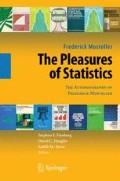Abstract
In the 1950s and 1960s in the United States, social research had made considerable progress in the ability to study questions relevant to policy. Most such work had been done in economics. Advances in computers, research on sample surveys, and experience in studying complex questions provided a base for understanding strong investigations. One such strong investigation was the study made by James Coleman and colleagues, the central theme of this chapter.
Access this chapter
Tax calculation will be finalised at checkout
Purchases are for personal use only
Preview
Unable to display preview. Download preview PDF.
References
Bernstein, A. (2006). Mathematical theorist: Frederick Mosteller. Washington Post. July 25, 2006, B06.
Box, G. E. P. (1966). Use and abuse of regression. Technometrics, 8(4):625– 629.
Bunker, J. P., Barnes, B. A., and Mosteller, F., editors (1977). Costs, Risks, and Benefits of Surgery. New York: Oxford University Press.
Civil Rights Act of 1964, P.L. No. 88–352. 78 Stat. 241 (July 2, 1964).
Coleman, J. S., Campbell, E. Q., Hobson, C. J., McPartland, J., Mood, A. M., Weinfeld, F. D., and York, R. L. (1966). Equality of Educational Opportunity. 2 volumes. Washington, D.C.: Office of Education, U. S. Department of Health, Education, and Welfare, U. S. Government Printing Office. OE-38001; Superintendant of Documents Catalog No. FS 5.238:-38001.
Moses, L. E. and Mosteller, F. (1997). Experimentation: Just do it! Chap. 12 in B. D. Spencer, editor, Statistics and Public Policy (Festschrift in Honor of I. Richard Savage). New York: Oxford University Press. 212–232.
Mosteller, F. (1995). The Tennessee study of class size in the early school grades. The Future of Children, 5:113–127.
Mosteller, F. (1999). How does class size relate to achievement in schools? Chap. 6 in S. E. Mayer and P. E. Peterson, editors, Earning and Learning. Washington, D.C.: Brookings Institute Press and Russell Sage Foundation. 117–129.
Mosteller, F. and Boruch, R. F., editors (2002). Evidence Matters: Randomized Trials in Education Research. Washington, D.C.: Brookings Institute Press.
Mosteller, F. and Moynihan, D. P., editors (1972). On Equality of Educational Opportunity: Papers Deriving from the Harvard University Faculty Seminar on the Coleman Report. New York: Random House.
Author information
Authors and Affiliations
Editor information
Editors and Affiliations
Rights and permissions
Copyright information
© 2010 Springer Science+Business Media, LLC
About this chapter
Cite this chapter
Mosteller, F. (2010). Equality of Educational Opportunity: The Coleman Report. In: Fienberg, S., Hoaglin, D., Tanur, J. (eds) The Pleasures of Statistics. Springer, New York, NY. https://doi.org/10.1007/978-0-387-77956-0_6
Download citation
DOI: https://doi.org/10.1007/978-0-387-77956-0_6
Published:
Publisher Name: Springer, New York, NY
Print ISBN: 978-0-387-77955-3
Online ISBN: 978-0-387-77956-0
eBook Packages: Mathematics and StatisticsMathematics and Statistics (R0)

